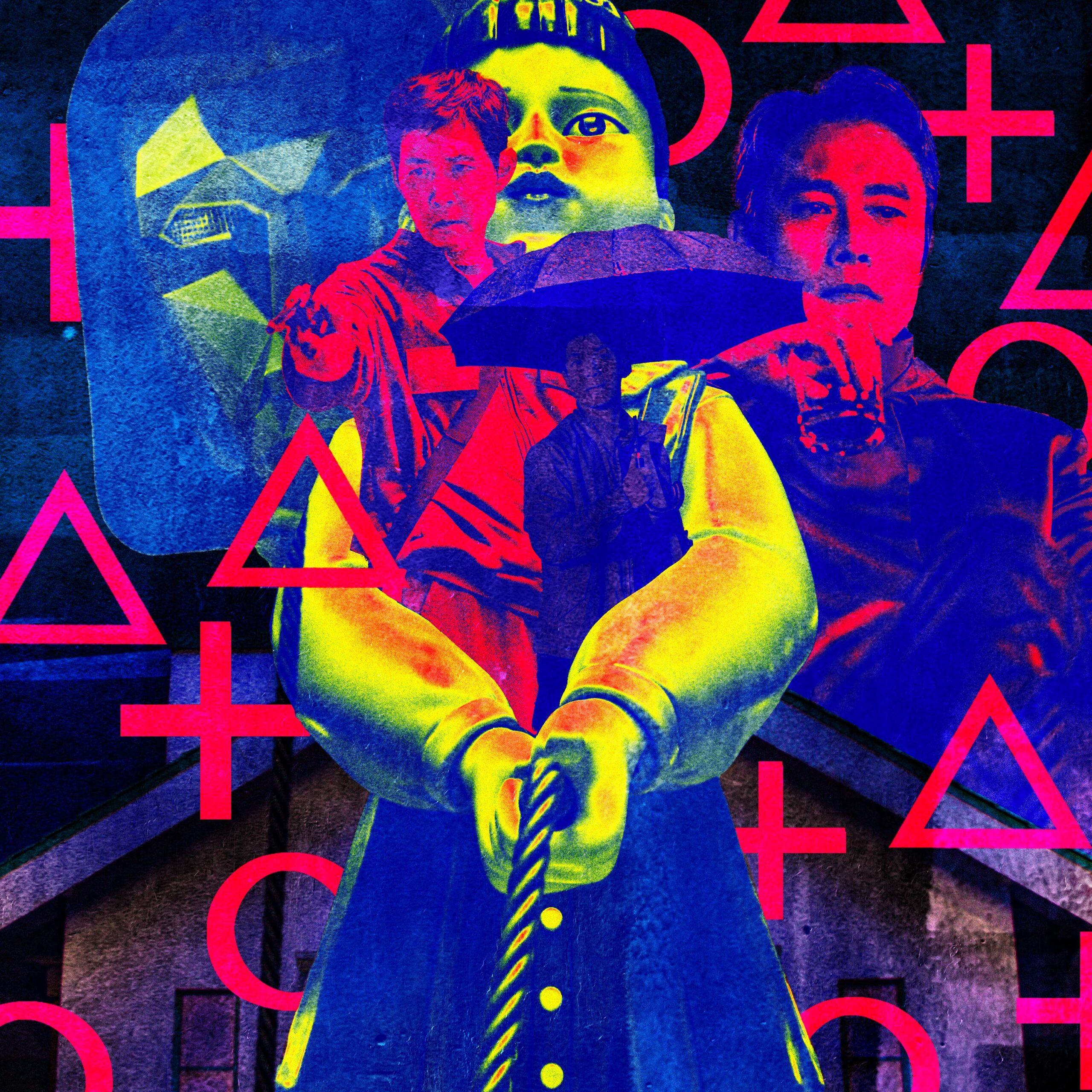

The second season of Squid Game ended with a devastating cliff-hanger: After Seong Gi-hun’s (Lee Jung-jae) attempt to overthrow the overseers of the games failed miserably, Player 456 was forced to watch his friend Park Jung-bae (Lee Seo-hwan) be executed in front of him. Gi-hun’s fate was left unresolved, along with the rest of the plotlines surrounding his return to the fatal competition.
The momentum of the series was interrupted by an ending that felt less like a season finale than it did a midseason break. Regardless of how Netflix has labeled the series’ installments, that’s effectively what its final two seasons are: two parts of a single narrative that serves as a follow-up to the global sensation that was the first season of Squid Game. And now, following a six-month hiatus, the hit Netflix series has returned with Season 3 to bring Gi-hun’s story to a true conclusion.
In Season 2, Gi-hun sacrificed the cushy life he could’ve had after securing the 45.6-billion-won prize for outlasting the other 455 contestants who participated in the games. Instead of traveling to Los Angeles to be with his daughter, Gi-hun spent the next few years—and a considerable portion of his winnings—trying to find a way to shut down the deadly competition once and for all. All of that effort amounted to a failed covert operation that led him back to where he started: in the heart of the games, trying not only to survive but also to save the lives of the other players—all while going up against some of the most desperate, greedy people humanity has to offer.
Season 3 picks up right where Season 2 ended, with Gi-hun reckoning with the consequences of the failed rebellion that could’ve saved the remaining players from the games’ predatory controllers, and from themselves. The final six episodes of Squid Game have their fair share of highlights that serve as a reminder of why the series became such a surprise hit when its first season premiered in 2021, including some truly unhinged narrative decisions that will surely spur debates online. But Season 3 also stumbles along its path to an unsatisfying, frustrating conclusion.
When Squid Game first became a global phenomenon, a large part of its appeal came from the games themselves. Creator Hwang Dong-hyuk’s thrilling, bloody reimagining of classic children’s games—supported by the show’s spectacular set designs—was a shocking yet alluring source of entertainment that helped make the series a perfect fit for Netflix’s binge-centric release model. And in Season 3, this aspect of Squid Game is where the show still shines brightest.
Just as Season 2 introduced a number of new games to the competition, Season 3 taps into a steady source of suspense and drama through fresh spins on childhood classics, including hide-and-seek and jump rope. This time around, Squid Game elevates some of these sequences by experimenting with various filmmaking techniques that make the viewing experience even more exciting and immersive.
During the hide-and-seek round, players are placed on one of two teams, with one group of seekers—wielding knives—assigned the task of eliminating the other team with lethal force by the end of the allotted time. As both sides traverse a labyrinthine series of rooms full of whimsical, starry designs, the camera sometimes lingers on an extended shot—or otherwise follows a given player, without any cuts in the edit—to make full use of the stunning set and depict how these characters are occupying the same space (and how narrowly they’re missing each other). And during the subsequent jump-rope game, the cinematography gets just as twistedly playful, utilizing shaky point-of-view shots as players like Gi-hun attempt to cross a narrow path to safety while avoiding a massive cable that swings toward them at high speed.
But Season 3 also draws out some of the novel concepts that were introduced in Season 2 for too long, and story lines get overbaked across what is essentially a 13-episode combined narrative.
While the inclusion of voting for the continuation of the competition between every round initially provided an intriguing social commentary on the importance of the democratic process and the complicity of the games’ victims in perpetuating their dire predicament, the idea loses its luster when the outcome is inevitably the same each time. (Of course, the alternative would’ve been even worse: If the players had actually come to their senses and simply voted to go home, Squid Game would have concluded in the most anticlimactic way imaginable.) And detective Hwang Jun-ho’s (Wi Ha-joon) lengthy search for the island where the games are held likewise overstays its welcome, without delivering enough of a payoff to make all of the screen time that it burned worth it.
What perhaps distinguishes Squid Game’s third season the most from a narrative perspective, for better or worse, is the emergence of a certain CGI baby: Kim Jun-hee’s (Jo Yu-ri) child, who has the misfortune of being born while her mother is still trapped in the games. As one of the show’s teasers suggested, and as the creator confirmed in an interview with Entertainment Weekly, this baby plays “a very important role in Season 3, not just for Jun-hee, but [also] for the fate of everyone inside.” And Hwang Dong-hyuk wasn’t lying. The offspring—rendered in all of its distracting CGI glory—becomes the key to the latter half of the games, and ensuring its safety becomes a new noble goal for the despondent Gi-hun to aspire to.
While speaking to The Guardian, Hwang explained that one of the questions he wanted to explore in this season was, “Do we have the will to give future generations something better?” And Hwang’s answer lies in how the players react to this baby’s sudden arrival in the midst of the high-stakes games.
Without getting too deep into the specifics of the series’s conclusion, there is a bleak, overwhelming sense of futility at the end of the season. And that outcome was very much by design. “People like a happy ending,” Hwang told The Guardian. “I’m like that too. But some stories, by nature, can’t have one. If you try to force one, the essence is compromised. If a story is holding up a mirror to something, then it’s not always a happy ending. Squid Game is no exception.”
While I agree with Hwang’s storytelling sensibilities, the series finale falls short of producing a result that makes the journey feel worth it. Season 1 featured a similarly dark conclusion, as Kang Sae-byeok (Jung Ho-yeon) and Cho Sang-woo (Park Hae-soo) die in the final two episodes, leaving Gi-hun as the unlikely sole survivor (not including Oh Il-nam, the games’ undercover creator). Except Gi-hun can’t even enjoy the spoils of his victory after losing his friends and returning home to find that his mother died while he was away; winning exacted too heavy a toll. That bleak outcome worked so well largely because of the strength of the supporting characters around Gi-hun, with the preceding developments of Sae-byeok’s and Sang-woo’s respective arcs—and the established relationship that Gi-hun had with his mother—paying off in a way that allowed the tragic costs of the deadly competition to resonate.
Due in part to the uneven pacing of the second and third seasons, and their more ambitious scope, the Season 3 finale lacks the same degree of emotional tension that injected much-needed suspense into the concluding round of the initial games. While it may have been too predictable for Squid Game to save most of its primary characters for the final conflict, what we’re left with instead is a group of mostly unnamed players who cartoonishly highlight the show’s theme of greed. The season still boasts some strong returning characters, but too much time is wasted on less dynamic figures who could’ve been used more effectively.
In the end, Squid Game does offer a message about persistent hope for humanity—though it’s one that is delivered more to (and likely better received by) the audience than any of the characters within the world of the show. And a stunning cameo in the episode’s final moments all but confirms that Squid Game will live on as a franchise, one way or another, further underscoring the futility of Gi-hun and Jun-ho’s quest to vanquish the games altogether. The open-ended teaser likewise highlights the irony of Netflix’s plans to continue building its anti-capitalist franchise into the streaming business empire that the series has come to be, as Squid Game plants several seeds for potential spinoffs and sequel series.
Although Squid Game might not have completely stuck its landing, its third season still offers plenty of absurd thrills that make the series well worth one final binge. It was always going to be a tall task to replicate the sensational success of its initial nine-episode run, and Season 3 may demonstrate some of the series’ conceptual limitations. But financially, the franchise has fewer constraints: Whether it’s Hwang or David Fincher who ends up expanding the Squid Game universe, Netflix has made it clear that the games aren’t over yet.




